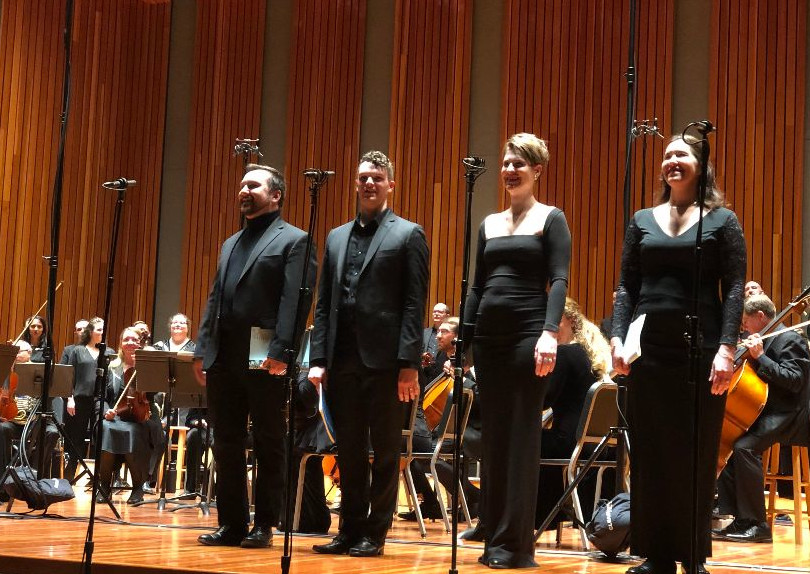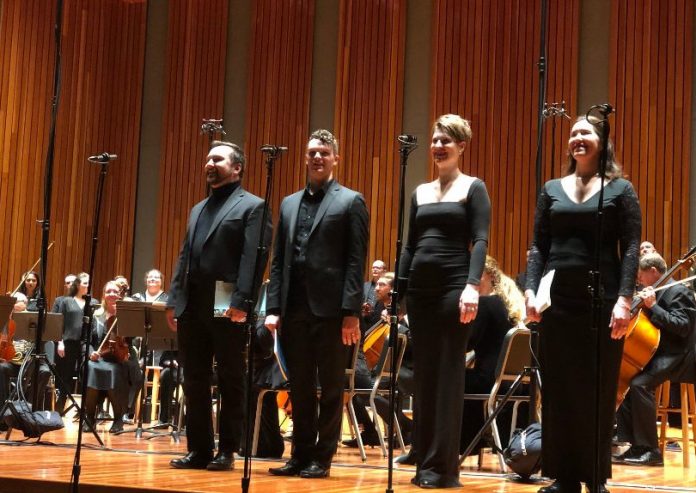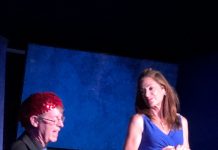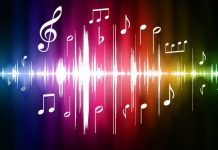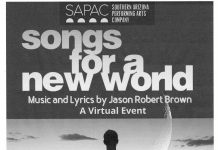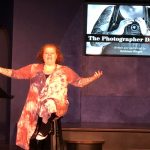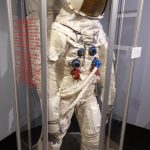True Concord offered rarely performed work by Johannes Brahms, Alto Rhapsody, at a recent concert in Tucson. It was book-ended by two Beethoven pieces, the controversial Mass in C Major (Op. 86), and his Choral Fantasy (Op. 80)
With its uncommon configuration of contralto soloist with a men’s chorus and orchestra, the Brahms is, as the programme notes state, “a rare and precious event.” Featuring as the contralto was the superb Emily Marvosh. She is graced with a voice that captured the essence of the lyrics, elevating her delivery beyond a mere performance of the music. With poignant words leavened with angst, it is a difficult role for any contralto, and, as conductor Eric Holtan said, “it requires one who can really deliver the low notes.”
The Rhapsody is based on an eighteenth century text by Goethe, which Brahms set to music nearly a century later, with a premiere in 1870. Goethe’s poem was inspired by his meeting with a suicidal young man, who he convinced not to end his life. The poem portrays this outcast from society and his psychological pain. Thus, the private experience of the real young man became the basis of public learning about mental illness via Goethe’s poem, likely the first example of its kind and very relevant to society today. Goethe was the prime exponent of Romantic science, and here we see the romantic theory of subjective ineffability expressed in his poem, and through Brahms, to an even wider audience fortunate enough to hear and understand his Rhapsody.
First on the bill was Beethoven’s Mass. A theologian told me “I have always found the Mass in C Major as a strangely unchristian musical setting of liturgical texts. It makes me passionately ambivalent (if I may be permitted such an oxymoron). I like it aesthetically but I dislike its theology.”
What I found most interesting were these lines sung in the Mass, referring to God:
Maker of heaven and earth,
and of all things visible and invisible.
What was encompassed in Beethoven’s understanding of the invisible? The text of the Nicene Creed from early 4th century was evocative of a very rich “invisible” part of a hierarchical creation (common in neoplatonism and gnosticism but also in PseudoDionysius etc). Beethoven was a child of a very different cultural era, however. For him, the invisible would have been much diminished, probably reduced to the “bare bones” of God, Angels & Demons, and, probably, the disincorporated souls of the deceased.
Would he have associated physico-cosmic forces discussed in his day (gravity, vital force, chemical affinity, microbes, magnetism, mesmerism, electricity…) with “the invisible”? Possibly, but I would think not. Rather, the term was probably already perceived as somewhat anachronistic and largely incomprehensible – and above all – belonging to a bygone cosmology. The 4th century idea of the invisible was linked to a hierarchical universe: an idea largely abandoned after the turmoil of the French Revolution.
True Concord delivered a truly authentic version of the Mass. Holtan said the group is dedicated to performing pieces in a “historically sensitive” manner, so “we use the Austro-Hungarian pronounciation of the Latin, just as Beethoven would have heard.” Four soloists were featured here: Chelsea Helm, Helen Karloski, Edward Vogel and Brian Giebler. Of Giebler, I spoke to one person in attendance visiting from New York City. “I have Lincoln Center experience,” he said, “and I can say the voice of Giebler is phenomenal. It was also nice to see an animated conductor; I’ve seen some who are quite stiff!” There was a very fine interweaving of the soloists’ voices as they created a matrix of devotion upon which was delivered a concise version of the birth, life and death of Jesus.. Beethoven, like most people living in Europe in 1807, surely longed for the peace he so earnestly ends the Mass with.
Beethoven’s Choral Fantasy (Op. 80) was premiered the same night as his 6th Symphony (Op. 68) in the famous 4-hour concert in Vienna on Dec. 22, 1808. In the Choral Fantasy, which concluded the concert by True Concord, Beethoven wrote about flowers explicitly in words sung by the chorus:
Graceful, charming and sweet is the sound
Of our life’s harmonies,
and from a sense of beauty arise
Flowers which eternally bloom.
One of Beethoven’s favorite books was Christoph Christian Sturm’s Reflections on the Works of God in the Realm of Nature from the 1780s, a compendium of daily homilies. He derived inspiration from this work in writing some of his compositions, including the Fantasy. Sturm wrote:
Wheresoever we walk, flowers spring up beneath our feet, the fragrance
and beauties of which are destined to soothe and alleviate the hardships
attendant on the pilgrimage of life. The same regular succession is
observed in the human race as in plants and flowers.
Sturm described real flowers, various species of which bloom and die in succession, while the flowers Beethoven invoked in the Fantasy bloom eternally. Pianist for the Fantasy was Jeffrey Biegel. The solo piano introduction to the Fantasy showcased the talents of Biegel, whose sympatico with the score was quite apparent from the beginning. He delivered intensity when needed and a textural delicacy when a lesser pianist would have merely fluttered his fingers over the keys.
This special touch can surely be attributed to his judicious use of the pedals, as he explained before the concert. “There is a sweet spot in the pedal, that you an incredible sound that is clear, not dry. Basically the piano is a harp, but the only way to get that string sound is with a pedal.” Speaking like a sous chef preparing the finest of dishes, Biegel said “the pedal seasons the sound.”
Overall a tremendous concert on Feb. 22, held at the Catalina Foothills High School. The last performance will be held Feb. 24.
Visit the website for tickets to future event: trueconcord.org
Photo by C Cunningham: soloists (l to r): Vogel, Giebler, Helm, Karloski
